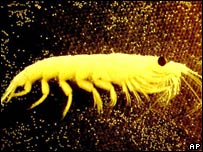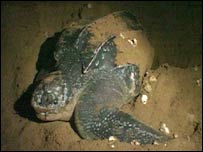Untitled Document
 |
Habitat for seals is disappearing |
Climate change could lead to the extinction of many animals including
migratory birds, says a report commissioned by the UK government.
Melting ice, spreading deserts and the impact of warm seas on the sex of turtles
are among threats identified.
The report is being launched at a meeting of EU nature conservation chiefs
in Scotland.
It says that warming has already changed the migration routes of some birds
and other animals.
The UK's Department of Environment, Food and Rural Affairs (Defra) commissioned
the research, which was led by the British Trust for Ornithology.
The meeting, in the Scottish holiday resort of Aviemore, was called to discuss
ways in which wildlife might be helped to adapt to global warming.
Times already changing
Scientists have already observed a wide range of changes in the migration patterns
of birds, fish and turtles, apparently in response to warming which has already
taken place.
Some species normally associated with more southerly countries, such as the
little egret, the loggerhead turtle, and the red mullet, are increasingly seen
in and around the UK.
 |
Krill, low down on the food chain, are affected by climate change |
Wading birds such as the ringed plover are now spending the winter in the east
of Britain rather than on the west coast, and chiff-chaffs are remaining in the
UK throughout the year rather than migrating south.
While many species have been able to adapt to new conditions simply by moving
their ranges further towards the poles, the study warns that this option is
not available to other animals, such as polar bears and seals whose habitat
is disappearing rapidly with the melting of Arctic sea ice.
Even subtle changes in sea temperature can have dramatic impacts on wildlife
with rapid depletion of the tiny plankton organisms which form the base of the
food web in the oceans.
This is thought to have contributed to a recent drastic decline in the breeding
success of some Scottish seabirds, as the fish on which they depend were suddenly
deprived of food.
Some of the other threats from climate change identified in the study include:
Increased storminess damaging the breeding colonies of albatross, already
facing heavy pressure from accidental capture on long-line fishing hooks
Sea level rise destroying beach nesting sites for sea turtles - for example,
nearly a third of beaches used by turtles in the Caribbean would be lost
with the rise anticipated during this century, and seals and wading birds
also face destruction of their coastal habitats
Warmer seas could lead to some turtle species becoming entirely female,
as water temperature strongly affects the sex ratio of hatchlings
Growing water scarcity in many regions could further destroy the wetland
areas on which migrating waterfowl depend.
The spreading extent of the Sahara desert could threaten long-range travellers
such as the swallow, as they will be unable to "fuel up" in previously
fertile regions on the desert's edge.
"Our changing climate is already affecting a wide range of migratory species,"
said Humphrey Crick from the British Trust for Ornithology, one of the report's
authors.
"They range from the swallow crossing the Sahara to the albatrosses of
the southern oceans; but this report shows that the potential impacts are really
widespread.
"There is some scope for helping species adapt to climate change, but
we need to find global solutions to help animals that swim, fly and walk thousands
of miles each year."
Too far, too fast
 |
Warmer seas could render some turtle species entirely female |
Nature has always had to adapt to changing climate conditions.
Indeed, it is one of the driving forces behind the process of evolution which
has produced the staggering variety of life on Earth.
But the fear is that the changes currently under way are simply too rapid for
species to evolve new strategies for survival.
Their options are also being narrowed by the rapid conversion of ecosystems
such as the draining of wetlands, felling of forests and development of coastlines
- so if their existing habitats are hit by global warming, there is literally
no place to go.
The report has important messages for conservation officials gathered in Scotland
for this meeting convened by Defra.
They are being urged to make more use of "biological corridors" to
widen the options available to migrating species as climate change takes hold.
The whole approach to conservation may have to be radically changed - the most
perfectly-protected nature reserve could end up being of little use if the animals
breeding there face starvation because they have nowhere to migrate.

